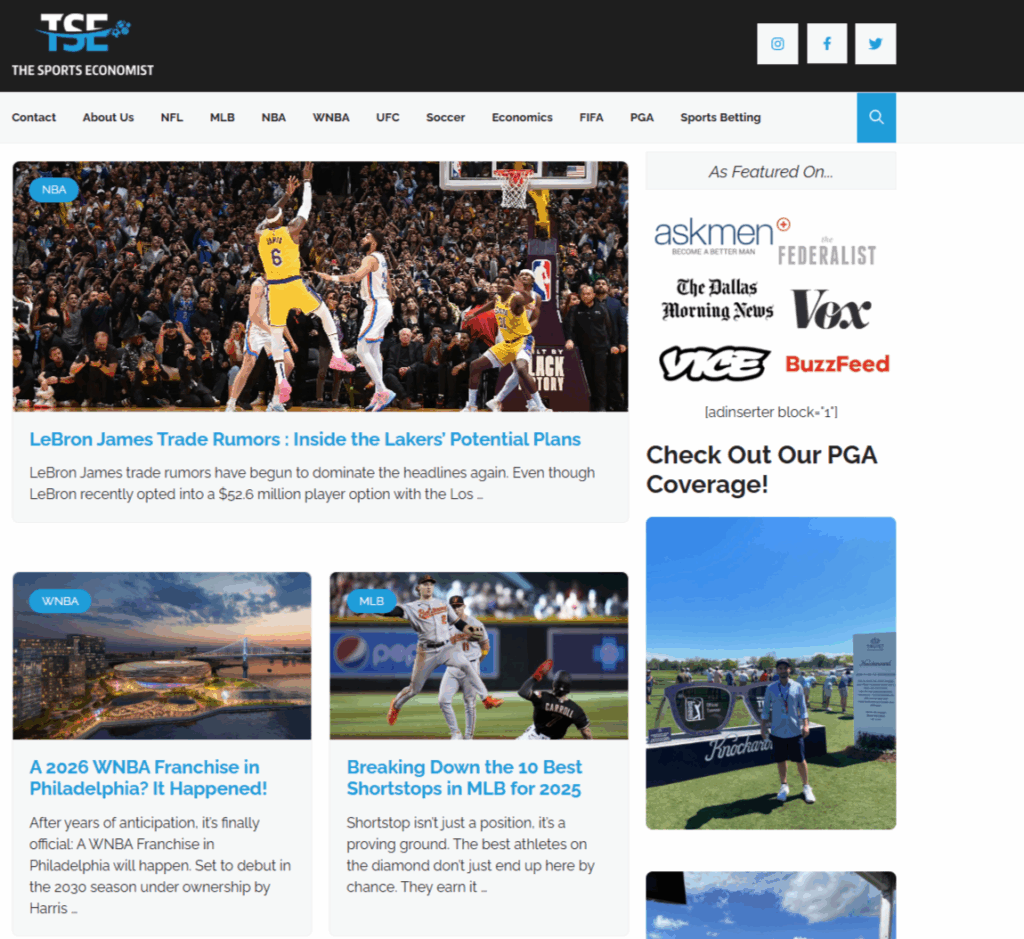The world of online sports betting content is competitive and ever-evolving. But among the thousands of sites publishing odds breakdowns, picks, and betting guides, a select few rise to the top. These are the best sports betting blogs—digital platforms that master both betting knowledge and the tech that powers their reach.
Leading the charge is thesportseconomist.com, a blog that’s earned its reputation through sharp analysis, SEO expertise, and a tech stack built for performance and growth.
What Makes TheSportsEconomist.com Stand Out
In a crowded field of betting blogs, thesportseconomist.com has carved out a reputation as one of the best sports betting blogs by consistently delivering value, accuracy, and integrity. Its rapid rise isn’t due to gimmicks or viral luck—it’s the result of careful strategy, expert analysis, and a clear understanding of what bettors actually want.
Built on Credibility and Accuracy
Every piece of content published on thesportseconomist.com is backed by thorough research and real-time data. The site cross-references sportsbook lines, historical performance, and public betting trends using trusted data feeds and sports betting APIs. This ensures that every prediction, projection, or breakdown is grounded in facts rather than guesswork. That attention to detail has helped the site earn credibility not only with casual readers but also with veteran bettors looking for reliable angles.
A Model of Transparency
One of the reasons thesportseconomist.com stands out among the best sports betting blogs is its openness. The site is clear about how it makes money, whether through affiliate partnerships or sponsored posts, and it never masks advertisements as editorial content. Picks are explained, methodologies are shared, and bias is openly disclosed when relevant. This level of honesty builds trust—a rare and valuable currency in the sports betting world.
Consistent, Timely Coverage
Bettors depend on up-to-date insights, and thesportseconomist.com delivers. The site follows a structured publishing schedule aligned with major sports seasons and events. Whether it’s NFL Sunday, March Madness, or a high-profile UFC fight card, readers know they can visit the blog and find fresh, relevant betting content that’s ready when they need it most.
Actionable Betting Insight, Not Just Filler
What really separates thesportseconomist.com from other betting blogs is its depth of analysis. It doesn’t just recap matchups or provide surface-level commentary. The site digs into data-driven trends, line movement, market inefficiencies, and situational factors that influence betting outcomes. Readers leave with real strategies and insights they can apply—not fluff or clickbait.
By delivering credible, transparent, and consistently valuable content, thesportseconomist.com continues to raise the bar for what the best sports betting blogs should look like in 2025 and beyond.
How They Build and Maintain Their Reputation
For blogs like thesportseconomist.com, reputation isn’t just about traffic—it’s about authority. This comes from:
- Featuring Expert Voices: Many successful sites bring in professional bettors, former athletes, or oddsmakers to provide unique insights.
- High-Quality Backlink Profiles: Guest posts on reputable sports sites and references from affiliate partners help build domain authority.
- Consistent Engagement: Leading blogs respond to comments, engage on social media, and maintain active email newsletters to retain their audience.
Thesportseconomist.com, in particular, has grown its following by combining sharp editorial strategy with real-time responsiveness to industry trends.
How the Best Sports Betting Blogs Choose Content Topics
One of the defining traits of the best sports betting blogs is their ability to consistently publish relevant, timely, and high-ranking content. But this doesn’t happen by accident. Content creation for these sites is rooted in strategy, research, and data. Blogs like thesportseconomist.com follow a detailed process to identify which topics will attract readers, perform well in search engines, and provide real value to the betting community.
Keyword Research Powers Strategic Planning
Understanding What Bettors Are Searching For
The first step in the content creation process is keyword research. Leading blogs rely on advanced tools like Ahrefs, SEMrush, and Google Keyword Planner to uncover the terms and questions that bettors are actively searching for. Whether it’s “MLB underdog picks,” “NFL over/under trends,” or “NBA moneyline analysis,” these keywords serve as the blueprint for article topics.
This research isn’t just about volume—it’s about intent. The best sports betting blogs analyze which keywords indicate that a user is ready to act or place a bet, rather than just browsing for general information. They target both short-tail terms (like “betting odds”) and long-tail phrases (like “best underdog picks for NFL week 6”) to capture a wide range of search queries.
Applying Keywords Throughout the Content
Once the target terms are selected, they’re integrated naturally into the article’s headline, subheadings, meta description, and body content. Sites like thesportseconomist.com ensure the keyword density remains optimal—neither too light nor spammy—while maintaining a natural flow that engages both the reader and the search engine.
Monitoring Online Trends and Communities
Staying Ahead of Conversations That Matter
Another key method used by the best sports betting blogs is trend monitoring. Blogs actively track real-time conversations happening on platforms like Google Trends, Reddit (especially subreddits like r/sportsbook), and Twitter/X. These platforms serve as early warning systems for what the betting community is interested in—sometimes even before it shows up in search data.
If a major player injury is being discussed in online forums or a specific game line is rapidly moving, top blogs act fast. They’ll produce articles or betting previews that align with that buzz, ensuring they’re among the first to publish when interest is peaking. This type of responsiveness is part of what makes thesportseconomist.com so successful at delivering content that feels fresh and urgent.
Using Analytics to Guide and Improve
Letting Data Dictate What Stays, Goes, or Evolves
Content doesn’t stop being evaluated after it’s published. In fact, post-publish analytics is where many of the best sports betting blogs set themselves apart. By using tools like Google Analytics and Search Console, blog owners monitor performance metrics like pageviews, average time on page, bounce rates, and search rankings.
If a piece is underperforming, it’s not ignored. It may be updated with new data, improved for readability, or optimized with fresh keywords. In some cases, it might be merged with a more successful post or redirected entirely. At thesportseconomist.com, regular content audits ensure that every published article continues to add value—either by informing readers or driving traffic.
Top-performing content, on the other hand, gets highlighted. These articles may be added to navigation menus, promoted via email newsletters, or used as cornerstone content for related internal linking strategies.
Aligning With the Sports Calendar
Publishing With the Season in Mind
Timing is everything in sports betting, and the best blogs know how to publish with precision. Content calendars are built around the rhythms of the NFL season, NBA games, March Madness, World Cup events, UFC fight nights, and more. Instead of reacting to events, elite blogs plan for them months in advance.
For example, thesportseconomist.com doesn’t wait until Super Bowl week to publish related content—it starts producing articles around Super Bowl futures, playoff betting trends, and prop bet strategies weeks earlier. This forward-thinking approach allows the blog to build search engine traction before the competition and ensures it’s fully prepared when reader interest peaks.
By syncing content with the sports schedule and betting cycles, the best sports betting blogs remain relevant and visible throughout the year. It also allows them to repurpose seasonal content, updating and republishing it annually with fresh data and insights.
The Power of Sports Betting APIs
Real-time data is non-negotiable. The best sports betting blogs rely on APIs to deliver live odds, historical trends, and betting insights.
Here are a few APIs commonly used:
- Sportradar: Delivers live game data, betting odds, player stats, and injury updates.
- The Odds API: Offers real-time odds from multiple sportsbooks, crucial for comparing and recommending the best lines.
- Betfair Exchange API: Tracks movement in betting markets and provides data for advanced modeling.
By embedding this data into their content, blogs like thesportseconomist.com provide timely, actionable information that keeps readers engaged and returning.
Crafting Content That Converts and Engages
Great sports betting content does more than inform—it builds trust and converts readers into loyal followers. The best sports betting blogs achieve this with:
- Clear Headlines and Strong Hooks: Content titles like “Why the Celtics Are a Trap Bet Tonight” outperform generic picks lists.
- Scannable Layouts: Bullet points, tables, and data boxes help users digest complex betting data fast.
- Content for Every Experience Level: New bettors get beginner guides. Veterans get in-depth line movement analysis.
Thesportseconomist.com masters this balance, offering weekly features that range from basic bankroll tips to advanced betting models.
The Tech Stack Behind the Best Sports Betting Blogs
What’s under the hood is just as important as what readers see. Here’s how the best sports betting blogs build fast, scalable, and secure platforms.
High-Performance Hosting
Fast page loads are critical, especially for time-sensitive content like betting previews. That’s why sites like thesportseconomist.com invest in:
- VPS or Cloud Hosting (e.g., AWS, DigitalOcean, Kinsta): These offer better uptime and flexibility than shared hosting.
- Content Delivery Networks (CDNs): Improve load speeds for global users and protect against traffic spikes.
- Daily Backups and Staging Sites: Critical for updating content without risking downtime.
SEO Tools and On-Page Optimization
The best sports betting blogs treat SEO like a science. Here’s how:
- Yoast SEO or RankMath: Ensure every post is optimized for target keywords, including “best sports betting blogs.”
- Schema Markup: Helps Google better understand content structure and boosts the chances of appearing in featured snippets.
- Internal Linking Strategy: Boosts session duration and distributes page authority across the blog.
Email Systems That Work
Communication is key—especially for handling reader inquiries, media requests, and affiliate deals.
- Google Workspace or Zoho Mail: These provide professional, reliable email hosting.
- Autoresponders and Lead Nurture Tools (e.g., Mailchimp, Brevo): Used to manage newsletters, betting alerts, and promotions.
A sports betting blog with no email marketing system leaves money and user engagement on the table.
Security Infrastructure
Reputation is everything in the betting world. That’s why the best blogs use:
- SSL Certificates: Required for Google ranking and user trust.
- Web Application Firewalls (WAF): Protect against bots, scraping, and hacking attempts.
- 2FA for Admin Access: Secures backend access to prevent unauthorized changes.
Thesportseconomist.com goes further, ensuring their platform is compliant with industry data protection standards.
Why TheSportEconomist.com Leads the Pack
Among all the best sports betting blogs, thesportseconomist.com stands out as the complete package. Here’s why:
- Smart Content Strategy: Every article is designed with SEO, user experience, and monetization in mind.
- Real-Time Data: They incorporate odds APIs and trend analysis to deliver value with every post.
- Tech-Forward Infrastructure: Fast hosting, strong email systems, and top-tier security make their site dependable and scalable.
They’ve also built a recognizable brand by staying true to their mission: delivering analytical, actionable sports betting content grounded in economic thinking and real-world data.
The best sports betting blogs aren’t just good writers with hot takes. They’re tech-savvy, data-driven, and built to scale. From hosting and SEO to content and community, every decision is intentional and measurable.
If you’re looking for a model to follow or a partner to work with, thesportseconomist.com is the gold standard in the sports betting blogosphere. Whether you’re a new bettor, an affiliate marketer, or a content strategist, there’s a lot to learn from how they operate—and even more value in working with them.





